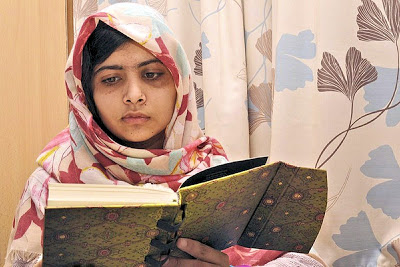Malala Yousafzai was shot in the head last year by a member of the Taliban whilst on a bus after school in order to silence her campaign for girls’ education. She was 15 at the time and had started campaigning aged 11. Several operations later in Pakistan and the UK, she addressed this week the UN stating that “The extremists are afraid of books and pens. The power of education frightens them. They are afraid of women. The power of the voice of women frightens them.” But she demands education for all children who have such basic right denied.
After the killing of female teachers, domestic violence, rapes and sexual assaults of all types used as weapons to prevent female participation in politics in several countries, the continuing practice of female genital mutilation and killing/aborting baby girls, the question arises of how much the hundreds of years of struggle for gender equality has achieved and what has to be done to stop the horrors still faced by so many women. Even in the world of sport, discrimination remains unchanged. ‘For the first time in 77 years a British tennis player has won the much coveted Wimbledon championship’, except that it is not true, as four British women won at Wimbledon in the singles categories, the last one in 1977, but these champions were airbrushed out of the media reports, because, simply, women do not count.
Malala follows a long and illustrious line of female writers, philosophers, activists and campaigners struggling for equality. In reality ‘proving’ that a woman can do the same as a man was only the way in to public and professional life. Then women, and men, discovered that women were bringing some different qualities to the workplace, to politics, to academia. But the battle to eradicate violence against women continues with no end in sight. There is no hope for an advanced nonviolent society whilst around half the population of the world remains effectively or potentially at risk of being victims of violence, often exercised by their own families and communities.
Something broke down in the human consciousness thousands of years ago. A gap opened, from matriarchal primitive societies and female divinities to our present day male domination and female discrimination. Eve is to blame for humanity being expelled from the Garden of Eden, women cannot be allowed to eat from the fruit of the Tree of Knowledge, look at what happened the first time!
Women adapted to use sex as a weapon, and joined in the power structure by doing what pleases men: it is the women that organise the FGM of their daughters, women discriminate against women, the success of stereotypes acquired during the formation years plays from the darkest corners of the mind on unsuspecting, well meaning people.
Malala is asking for the right to an education, but education is not only about knowledge, it is also about models of society, methodologies of action, and the search for the true meaning of human existence. Will she inspire the new generations to reflect on the need to close the gender gap as a first step to eliminate all forms of discrimination and all forms of violence, or will she be swallowed by the system to glorify a ‘clash of cultures’ driven by economic interests, whilst paying only lip service to her dreams, like so many promising youngsters were before her?
Since nothing can guarantee what Malala’s future will be, opening opportunities for other youngsters to help them bring about the world they would like to live in appears as a more interesting way of opening everybody’s future.






